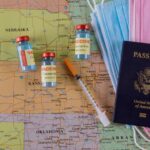Can I travel to Italy if I’m vaccinated? As the world continues to navigate the challenges of the COVID-19 pandemic, travel restrictions and requirements have become increasingly important for individuals planning international trips. Vaccination status has now emerged as a crucial factor in determining entry into certain countries, including Italy. Understanding the current travel restrictions and the relevance of vaccination status is essential for anyone considering a trip to Italy.
Italy, like many other countries, has implemented specific travel restrictions and requirements for inbound travelers due to the ongoing pandemic. These measures are put in place to ensure the safety and well-being of both residents and visitors alike. With vaccination now playing a key role in global efforts to combat COVID-19, it is important for travelers to be aware of how their vaccination status may affect their ability to enter Italy.
In this article, we will delve into Italy’s travel restrictions and requirements, particularly focusing on the implications for vaccinated individuals. We will explore the specific vaccination requirements, accepted vaccines, necessary travel documentation, quarantine or testing obligations, and provide helpful tips for vaccinated individuals planning a trip to Italy. By understanding these key factors, vaccinated travelers can better prepare for their trip and ensure a smooth entry into Italy.
Italy’s Travel Restrictions
As of the time of writing, Italy has specific requirements and restrictions for travelers entering the country in response to the COVID-19 pandemic. One of the most common questions asked is, “Can I travel to Italy if I’m vaccinated?” The answer is yes, but there are still certain guidelines and protocols that vaccinated travelers must adhere to.
Currently, Italy allows entry for individuals who have been fully vaccinated against COVID-19 with a vaccine approved by the European Medicines Agency (EMA) or World Health Organization (WHO). This means that individuals who have received vaccines such as Pfizer-BioNTech, Moderna, AstraZeneca, Johnson & Johnson, Sinopharm, or Sinovac-Coronavac can enter Italy for tourism purposes.
In addition to vaccination status, travelers must also complete a Passenger Locator Form before arriving in Italy. This form collects important information for contact tracing purposes and should be filled out within 48 hours prior to arrival in Italy. Additionally, all travelers, regardless of vaccination status, are required to present a negative COVID-19 test result taken within 72 hours before entering Italy.
These measures are put in place to ensure the safety of both residents and visitors to Italy amidst the ongoing pandemic. By following these requirements and restrictions, vaccinated individuals can safely enjoy their trip to this beautiful country.
| Requirement | Details |
|---|---|
| Vaccination | Individuals must be fully vaccinated with an EMA or WHO-approved vaccine |
| Passenger Locator Form | All travelers must complete this form before arriving in Italy |
| COVID-19 Test | All travelers must present a negative test result taken within 72 hours prior to entry into Italy |
Vaccination Requirements
Italy has specific vaccination requirements for travelers entering the country, especially in light of the ongoing COVID-19 pandemic. As of the current regulations, individuals who have been fully vaccinated against COVID-19 can travel to Italy under certain conditions. The Italian government has outlined these requirements to ensure the safety of both residents and visitors to the country.
When planning a trip to Italy, it is important for vaccinated travelers to be aware of the specific vaccination requirements set forth by Italian authorities. To provide clarity on this matter, here are the key points regarding vaccination requirements for travelers to Italy:
- Vaccination Status: Travelers must be fully vaccinated against COVID-19 in order to be eligible for entry into Italy without needing to quarantine upon arrival.
- Accepted Vaccines: Italy accepts vaccines that have been authorized by the European Medicines Agency (EMA) or recognized by the World Health Organization (WHO), including Pfizer-BioNTech, Moderna, AstraZeneca, and Johnson & Johnson.
- Timing of Vaccination: In addition to being fully vaccinated, travelers must ensure that they have received their final vaccine dose at least 14 days prior to their arrival in Italy.
It is worth noting that these vaccination requirements are subject to change based on updated guidance from health authorities and may vary for different categories of travelers. Therefore, it is advisable for vaccinated individuals planning a trip to Italy to stay informed about any updates or changes to these requirements before their scheduled travel dates.
Can i travel to italy if i’m vaccinated? It is essential for travelers to check with official sources for the most current information related to vaccination requirements for entry into Italy.
Accepted Vaccines in Italy
As of the current travel restrictions, Italy has specific requirements for the type of vaccines that are accepted for entry into the country. This means that not all COVID-19 vaccines are recognized for travel to Italy. Therefore, it is important for vaccinated individuals to be aware of the accepted vaccines in order to ensure that they meet the necessary criteria for entry.
Vaccines Accepted in Italy
Italy has established a list of approved COVID-19 vaccines for travelers entering the country. As of now, the vaccines accepted in Italy include Pfizer-BioNTech, Moderna, AstraZeneca, and Johnson & Johnson. It is essential to note that travelers must have received both doses (if applicable) of a two-dose vaccine or a single dose of a one-dose vaccine at least 14 days prior to arrival in Italy.
Proof of Vaccination
In addition to meeting the vaccination requirements, travelers can i travel to Italy if I’m vaccinated must also provide proof of vaccination in the form of a vaccination certificate or card. This documentation should include details such as the individual’s name, date(s) of vaccination, and information about the administered vaccine. It is crucial for vaccinated individuals to ensure that they have the necessary documentation readily available when traveling to Italy.
Travel Advisory
It is important for vaccinated individuals planning to travel to Italy to stay informed about any updates or changes regarding accepted vaccines and travel requirements. Checking with official sources such as the Italian Ministry of Health or the Embassy/Consulate can provide up-to-date information on vaccination requirements and any changes related to travel regulations. By being adequately prepared and staying informed, vaccinated travelers can successfully navigate entry requirements when visiting Italy.
Travel Documentation
Traveling to Italy has become a possibility for vaccinated individuals, but it’s important to ensure that all necessary travel documentation and proof of vaccination are in order before planning a trip. Italy has specific requirements for travelers entering the country, especially in light of the COVID-19 pandemic. Understanding what is needed in terms of travel documentation and proof of vaccination is essential for a smooth and hassle-free travel experience.
Required Travel Documents
In addition to a valid passport, travelers entering Italy must also be prepared to present specific travel documents related to the COVID-19 pandemic. This includes completing a self-declaration form and providing evidence of any necessary testing or vaccination. It’s important to stay informed about any updates or changes to these requirements as they may evolve over time.
Proof of Vaccination
For vaccinated travelers, providing proof of vaccination is crucial for entry into Italy. This typically involves presenting a certificate or card that verifies the individual has been fully vaccinated against COVID-19. It’s advisable to carry both physical and digital copies of this documentation as an added precaution while traveling.
Additional Precautions
While being vaccinated can facilitate travel to Italy, it’s important to note that certain health and safety measures may still be in place. This could include mask-wearing in public spaces, social distancing guidelines, and other precautions aimed at preventing the spread of COVID-19. Being mindful of these additional precautions can help ensure a safe and enjoyable trip while visiting Italy.
Ultimately, understanding the necessary travel documents and proof of vaccination required for entry into Italy is crucial for vaccinated individuals considering a trip to the country. By staying informed and prepared, travelers can navigate the entry requirements with confidence and enjoy their time in Italy without unnecessary disruptions.
Quarantine and Testing
As of the current travel restrictions, Italy has implemented specific requirements and restrictions for travelers entering the country. These measures are in place to ensure the safety of both residents and visitors amid the ongoing COVID-19 pandemic. However, with the rollout of vaccination programs worldwide, there have been changes to entry requirements for vaccinated individuals. Vaccinated travelers may have different protocols to follow compared to those who are unvaccinated.
In Italy, vaccinated travelers still need to adhere to certain guidelines upon entry into the country. While quarantine may not be required for fully vaccinated individuals, testing is still a necessity. Depending on the vaccination status and the traveler’s country of origin, different testing requirements may apply. It is important for vaccinated travelers to familiarize themselves with these guidelines before planning their trip.
Vaccinated travelers can demonstrate their vaccination status through a valid vaccination certificate or passport with evidence of vaccination against COVID-19. This documentation will be crucial for entry into Italy and must be presented at border control or when requested by authorities during their stay in the country.
| Requirement | Details |
|---|---|
| Vaccination Status | Proof of full vaccination required |
| Testing | Testing requirement varies based on origin country and vaccination status |
Tips for Vaccinated Travelers
If you are fully vaccinated and wondering, “Can I travel to Italy if I’m vaccinated?” the good news is that Italy has opened its borders to vaccinated travelers from certain countries. Here are some tips and advice for vaccinated travelers planning a trip to Italy:
1. Check Entry Requirements: Before traveling to Italy, make sure to check the entry requirements and restrictions for your specific country of departure. Each country may have different rules and regulations for travelers entering Italy.
2. Keep Proof of Vaccination: It is important to keep proof of your vaccination handy when traveling to Italy. Accepted forms of proof may include a vaccination certificate, vaccine passport, or digital COVID-19 vaccine record. Make sure to have both a physical and digital copy as a backup.
3. Stay Informed about Local Guidelines: While in Italy, it is important to stay informed about local guidelines and restrictions related to COVID-19. This could include mask-wearing requirements, social distancing measures, and any specific rules for public places or transportation.
4. Be Flexible with Travel Plans: As the situation with COVID-19 continues to evolve, it is important for vaccinated travelers to be flexible with their travel plans. This can mean being prepared for potential changes in scheduling, activities, or accommodations based on updated regulations.
5. Respect Local Communities: Finally, as a vaccinated traveler visiting Italy, it is crucial to respect local communities and their efforts to keep their residents safe during this time. This includes following any additional guidelines or requests from businesses or individuals in the areas you visit.
By following these tips and staying up-to-date on the latest information, vaccinated travelers can have an enjoyable and safe experience while exploring all that Italy has to offer.
Conclusion
In conclusion, while Italy has implemented specific travel restrictions and requirements for all incoming travelers, individuals who are fully vaccinated can enjoy more flexibility and fewer barriers when planning a trip to the country. With vaccination proving to be an effective tool in reducing the spread of COVID-19, many countries, including Italy, have adjusted their entry requirements to accommodate fully vaccinated travelers.
As detailed in this article, understanding Italy’s specific vaccination requirements, accepted vaccines, necessary travel documentation, and any quarantine or testing measures is crucial for vaccinated individuals considering a trip to Italy.
For vaccinated individuals planning to travel to Italy, it is important to ensure that they have received the full course of a COVID-19 vaccine that is accepted by Italian authorities. Additionally, travelers should familiarize themselves with the necessary travel documents and be prepared to provide proof of vaccination upon entry into the country.
While some testing requirements may still apply depending on the individual’s vaccination status and origin country, overall, being vaccinated significantly reduces the burden of testing or quarantine measures for travelers entering Italy.
Ultimately, as the global situation continues to evolve amidst ongoing efforts to mitigate the impact of the pandemic, staying informed about current travel restrictions and requirements is essential for anyone considering international travel. For those who are fully vaccinated and wondering “Can I travel to Italy if I’m vaccinated?
“, being proactive in understanding Italy’s specific entry requirements can help ensure a smoother and more enjoyable travel experience. By adhering to these guidelines and recommendations, vaccinated individuals can look forward to exploring all that Italy has to offer with greater peace of mind.
Frequently Asked Questions
Does Italy Have Any COVID Restrictions?
Italy has implemented various COVID restrictions to curb the spread of the virus. These include mandatory mask-wearing in indoor public spaces, social distancing measures, and capacity limits for gatherings and events.
What Is Required for a US Citizen to Visit Italy?
For a US citizen to visit Italy, they currently need to provide proof of full vaccination, a negative COVID test result, or proof of recovery from COVID-19. Additionally, travelers must also complete a digital passenger locator form before entering Italy.
What Is the Current Travel Advisory for Italy?
The current travel advisory for Italy varies depending on the specific region and its COVID risk level. The US Department of State advises travelers to exercise increased caution in Italy due to COVID-19 and also provides specific guidance for each region based on its risk level.

I’m a passionate traveler, writer, and Italophile. My fascination with Italy’s history, art, and culture has led me on countless adventures across the Italian landscape. Through “I Live Italy,” I share my love for this extraordinary country and aims to inspire others to explore its boundless beauty.




